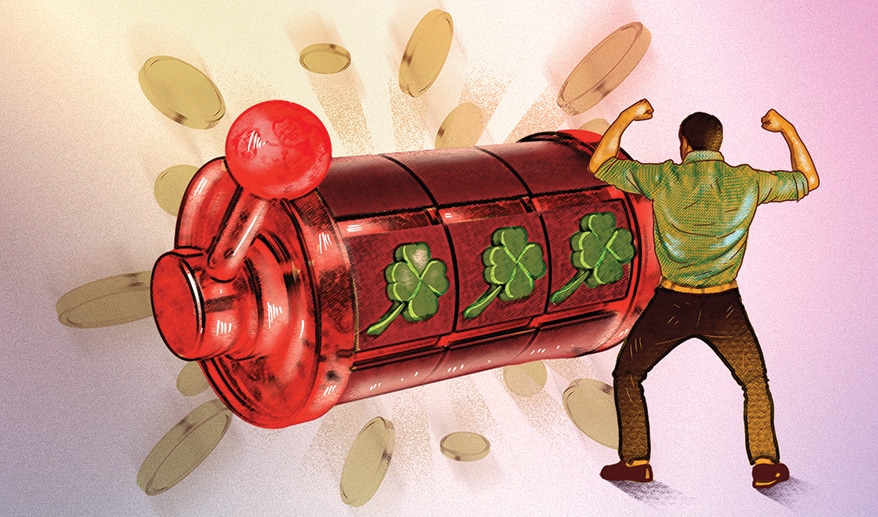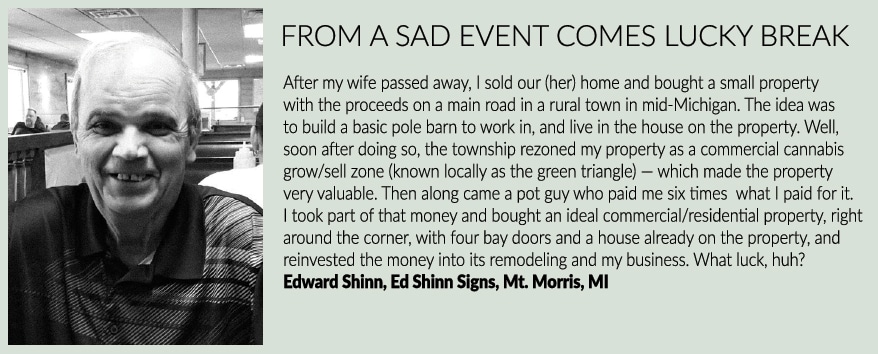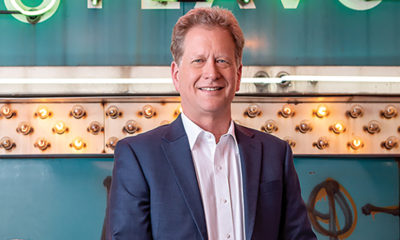
12 Ways to Increase Your Luck in the Sign Business
The concept of “good luck” is often derided, but with a few tweaks to the way you run your shop, you may find yourself the recipient of it.
Published
1 year agoon
BY A FACTOR OF greater than 9 to 1, the Signs of the Times Brain Squad “would rather be good than lucky.” Small wonder, then, that so many place little value on the role of luck in their businesses and lives.
Mallory Lynn, Signarama Brighton (Brighton, CO), sums up many fellow Brain Squad members’ responses well: “I’m not really one who believes in luck,” she says. “Sure, it happens like winning the lotto, but [in general] you create your own luck, which I would call opportunities. Your willingness to show up to that event, or be kind to that random stranger in the grocery store is what led to you meeting that client who loves you and owns five properties. Your drive to grow is why you went to ISA to learn about the latest technology,” Lynn continues, “and because of your investment, now your shop is doubling its output.”
Good fortune is derided and underrated, but let’s get this out of the way — more of your success in business can be attributed to luck than you may think. Yes, it’s a little unpalatable but true. And the more successful you’ve been, the luckier you’ve been. But luck also depends on your being hardworking and skilled at what you do.
Nobel Prize-winning behavioral economist Daniel Kahneman summed up this secret to professional success:
Success = talent + luck
Great success = a little more talent + a lot of luck

Kahneman’s studies into cognitive biases corroborate additional research that suggests we drastically undervalue the influence of luck in many situations, and overvalue it in others. It has to do with what psychologists refer to as the “locus of control,” or how much you think you control the events happening around you.
Most people have an internal locus when it comes to good things — they take credit for their success — but an external locus when things go wrong.
Most business owners and managers don’t usually want to talk about the role of luck in their success. It’s not just that it takes some of the shine off their accomplishments, but because in the purest, blindest sense, luck is random and thus out of their control. So, why bother?
But let’s also be real; there is a certain type of luck — dumb luck, winning-the-lottery luck, as Mallory Lynn mentioned earlier — that is not worth giving much thought to. But the other kinds — the luck you provoke, the fortunes and misfortunes you prepare for, the luck that can be tapped through networking and just being open to it, that luck that comes from hard work or your serendipitous networking — when fostered, can give your business a huge boost.
So, please, read on! We’ve shared some ideas from your fellow sign professionals, experts in this field, and from our own reading on how to be more lucky — as well as good.

“STAY FROSTY”
FOR LUCK
1 “You’re not lucky because more good things are actually happening; you’re lucky because you’re alert to them when they do,” psychology writer Maria Konnikova writes in The Biggest Bluff: How I Learned to Pay Attention, Master Myself and Win. “If we want to be successful, we need to train our powers of observation, to cultivate that attitude of mind of being constantly on the lookout for the unexpected and make a habit of examining every clue that chance presents.” Most people are simply not open to what’s around them — something that is becoming harder to cultivate in our age of constant distraction and never-ending connectivity. So…

OPEN YOUR MIND
AND RELAX
2 Good-luck events often reveal themselves in ambiguous, trivial ways, which can make them hard to detect. As the saying goes, “Actual great opportunities do not have ‘Great Opportunities’ in the subject line.” Thus, luck tends to favor the curious. “This is one of the most counterintuitive ideas,” says Richard Wiseman, a psychology professor at the University of Hertfordshire in the UK, and author of The Luck Factor. “We are traditionally taught to be really focused, to be really driven, to try really hard at tasks. But in the real world, you’ve got opportunities all around you. If you’re driven in one direction, you’re not going to spot the others. Unlucky people go to parties intent on finding their perfect partner and miss opportunities to make good friends. They look through newspapers determined to find certain types of job advertisements and as a result, miss other types of jobs. Lucky people are more relaxed and open, and therefore see what is there rather than just what they are looking for.”

LUCK CAN
BE LEARNED
3 ‘Lucky’ entrepreneurs who regularly question the norm and seek continuous improvements in their businesses and in themselves end up being luckier because they want to learn, says Anthony Tjan, author of Heart, Smarts, Guts and Luck. “They read new things, try new experiences, and are open-minded to a variety of relationships because they are curious. All of these things increase the probability for circumstantial luck … You will simply see more — and therefore increase your chances of finding luck — if you adopt the mindset ‘there is always more to see and more to learn.’”
How do you feel about luck?

TURN
THAT FROWN
4 Lucky people are certain the future will be bright, according to Wiseman. That expectation becomes a self-fulfilling prophecy because it helps them persist in the face of failure and positively shapes their interactions with other people. When things go awry, they ‘‘turn bad luck into good’’ by seeing how they can squeeze some benefit from the misfortune.
AdvertisementMy partner and I are extremely lucky that we’ve had the same drive and vision for the last 30 years. — Tish Scialampo, Absolute Sign Inc., Los Alamitos, CA
For example, some time ago, John Miller, Signs by Autografix (Branford, CT), was working out of a building not in a commercial zone. “A long-time sign guy in the same town informed the zoning department and the town forced me to move,” he says. Rather than letting it drag him down, “I bought a building and set up my shop there. Rather than rent, I began paying a mortgage and building equity.”

RESERVE JUDGEMENT
AND LISTEN
5 You want to change your relationship with ideas to be lucky, says Stanford School of Engineering Professor Tina Seelig. “Most people look at new ideas that come their way and they judge them: ‘That‘s a great idea’ or ‘That‘s a terrible idea.’ But it‘s actually much more nuanced. Ideas are neither good nor bad. And in fact, the seeds of terrible ideas are often something truly remarkable,” she says in her widely viewed TED talk on luck.
David Kinney, Kinney Custom Signs Inc. (Marina del Rey, CA) relates such an experience. “I took a call one day when no one at reception answered. As the person on the other end of the phone kept talking, I realized that his project was a couple of hours away from us and that I could refer him to a place closer to his project location. But he kept talking over me and I finally just listened to him,” Kinney says. “It ended up being a $140,000 project. The luck was in not only the size of the project but the learning experience as well.”
GO WITH
THE FLOW
6 “It helps to view life as a river in which lucky events — good and bad — will flow your way. It’s neither good nor bad. It just is,” writes Morten T. Hansen, co-author of Great by Choice, in a blog on the Harvard Business Review website. “When you start having this ‘luck flow’ mindset, you can start managing those events to your advantage, but only then.” It’s not the events that happen in life, but our reaction to them that matters.
A large national electrical company purchased a shop in the same area as Karrie Brock’s Fastsigns location in Toledo, OH, and could have been cause for concern. However, the acquisition changed thatshop’s marketing and job intake, so that they started referring jobs to Brock. “It changed our opportunities, so we evolved because of it. It was a blessing and lucky break for us to be more competitive in our local market,” she says. “Luck or opportunities come by chance; what you do with them comes with open mindedness.”

IT’S A WONDERFUL
LIFE, INDEED
7 The Journal of Personality and Social Psychology suggests an exercise in simple subtraction, which is a bit like the pivotal scene in It’s a Wonderful Life. Think about the positives in your life — your family, your business, your community, your health. Then start thinking about all the small events that had to take place for you to get to this point: What if your father hadn’t taken that summer job and met your mother, what if your great grandfather hadn’t opted to try his luck in America, what if penicillin hadn’t been invented … ?
What this does, according to the paper, is deepen your appreciation for what is happening in your life at this moment. It allows you to count your blessings. “I was lucky my uncle offered to teach me signwriting when I was a new single parent of a toddler,” says Cindy Gillihan, Gilly’s Super Signs (Placerville, CA). “[That] changed our lives.” Seth Vargas, Sleight of Hand Signs (Oakland, CA) can also relate: “I got lucky being in the last class that Doc Guthrie ever taught to completion at LATTC,” Vargas says. “He taught me the skills on how to letter, and run a signmaking business, and most importantly, be a man of integrity in both my personal and business life.”
PREPARATION
H-E-L-P-S
8 “Chance favors the prepared mind” is one of the most often-cited quotes about luck — attributed to Louis Pasteur. His actual statement was a little different: “Where observation is concerned, chance favors only the prepared mind.” It’s not enough just to spot a good-luck event; you need to be prepared to alter your plans to act on it.
When Chad Lawson, Sign Pro of Skagit Valley (Mount Vernon, WA), first started out, he worked for a large sign company. “I realized right away I wanted to own my own sign business but the market where I wanted to live was really saturated and my financial situation did not line up with my dream,” he says. “I just kept working hard and learning as much as I could, and then one day when an old boss called to sell me his business (the lucky part), I was prepared and he had the confidence to sell me his established business under contract. I have always believed that luck is being prepared when the timing is right.”

ALL WE ARE SAY-ING
IS “GIVE LUCK A CHANCE”
9 “Last year we were working on a high-profile and open-ended project,” says Thomas Turner, Bakers’ Signs & Manufacturing (Conroe, TX). “We were creating custom-finished panels with a unique type of metallic paint as part of this project. The production artist overestimated the required number of panels by one, leaving a spare finished panel and a gallon of unopened metallic paint. They were both stored and just about forgotten. A few months later, we discovered a global shortage on the unique type of paint and were told more would likely not be available until early 2023.” The open-ended project required new features for an annual event and two custom-painted panels. “The saved paint was enough to create one panel and we were in luck having the additional completed panel in storage,” Turner says. “Despite the unexpected unavailability of material, we were able to meet the project’s demands and keep the client happy. Though it sure seemed like good luck that we ended up with exactly what we needed at the right time, it can also be chalked up to conservative estimating. Most people in production roles understand that unexpected things nearly always happen. The old military adage, ‘two is one and one is none’ is subconsciously engrained in seasoned project managers, designers and fabricators. Expecting problems to occur and estimating on the high side to create a buffer can save any given project and potentially, a customer.”


FORTUNE FAVORS
THE BRAVE
10 “You gotta be in it to win it” is a better example of great advertising than applied math, but it is accurate: Even winning the lottery — the ultimate example of dumb luck — requires you to go out and buy a ticket, or at least open your phone. Taking action releases energy, and luck typically requires a catalyst and at least a small risk. As the salesperson’s creed goes, every time you don’t ask, the answer is “no.”

NETWORKS
BUILD LUCK
11 People who can help you the most in business often aren’t those closest to you — they are the secondary contacts, the friend of a friend, the associate of a key client, or some other person you know only tangentially. The reason is twofold: A secondary contact has nothing much invested in recommending you to someone else (the old saying about not letting business and friends mix) and because this person is not from your inner circle, they expose you to a wider network based on interests or connections you don’t have.
Nonnie Luther, Cadillac Sign Co. (Norwood, NC) knows a thing or two about this network: the connections made over the years doing business with people, not the companies they work for. “People move up in their careers and they remember how you treated them,” she says. “That’s cultivating your own ‘luck’ for the future — plus you sometimes make a really good friend, and that’s something truly lucky!”
LUCK IS NOT
A STRATEGY
12 As helpful as it can be, you never want to rely on good fortune. Luck is capricious at the best of times. Carl Heinlein, Cincinnati Custom Signs (Cincinnati), recognizes that while luck is out there, being ready and able allows a business to cash in when catching a lucky break. “I experienced the same thing that many other sign companies that I’ve talked to have experienced,” Heinlein says. “You get a phone call out of the blue from a large company. Then you make sure you are the best company they’ve ever met. You do a few small jobs for them and you do them extremely well and timely. You grow your relationship with them. You become a preferred vendor. Then you get the big break and a large contract comes through, and they are now your largest customer. You can call that first phone call ‘luck’ or opportunity — you just better be prepared to do a great job!”
Good luck!
Signs of the Times has been the world leader in sign information since 1906. Contact Signs of the Times' editors at editor@signsofthetimes.com.

SPONSORED VIDEO
Introducing the Sign Industry Podcast
The Sign Industry Podcast is a platform for every sign person out there — from the old-timers who bent neon and hand-lettered boats to those venturing into new technologies — we want to get their stories out for everyone to hear. Come join us and listen to stories, learn tricks or techniques, and get insights of what’s to come. We are the world’s second oldest profession. The folks who started the world’s oldest profession needed a sign.
You may like
Advertisement

ISA Announces New Tradeshows and Meetings VP

5 Reasons to Sell a Sign Company Plus 6 Options

Sign Products Wrap-Up for April
Subscribe

Bulletins
Get the most important news and business ideas from Signs of the Times magazine's news bulletin.
Advertisement
Most Popular
-

 Tip Sheet1 week ago
Tip Sheet1 week agoAlways Brand Yourself and Wear Fewer Hats — Two of April’s Sign Tips
-

 Ask Signs of the Times2 days ago
Ask Signs of the Times2 days agoWhy Are Signs from Canva so Overloaded and Similar?
-

 Real Deal1 week ago
Real Deal1 week agoA Woman Sign Company Owner Confronts a Sexist Wholesaler
-

 Benchmarks4 days ago
Benchmarks4 days ago6 Sports Venue Signs Deserving a Standing Ovation
-

 Editor's Note2 weeks ago
Editor's Note2 weeks agoWhy We Still Need the Women in Signs Award
-

 Women in Signs1 week ago
Women in Signs1 week ago2024 Women in Signs: Megan Bradley
-

 Product Buying + Technology2 weeks ago
Product Buying + Technology2 weeks agoADA Signs and More Uses for Engraving Machines
-

 Photo Gallery6 days ago
Photo Gallery6 days ago21 Larry Albright Plasma Globes, Crackle Tubes and More










